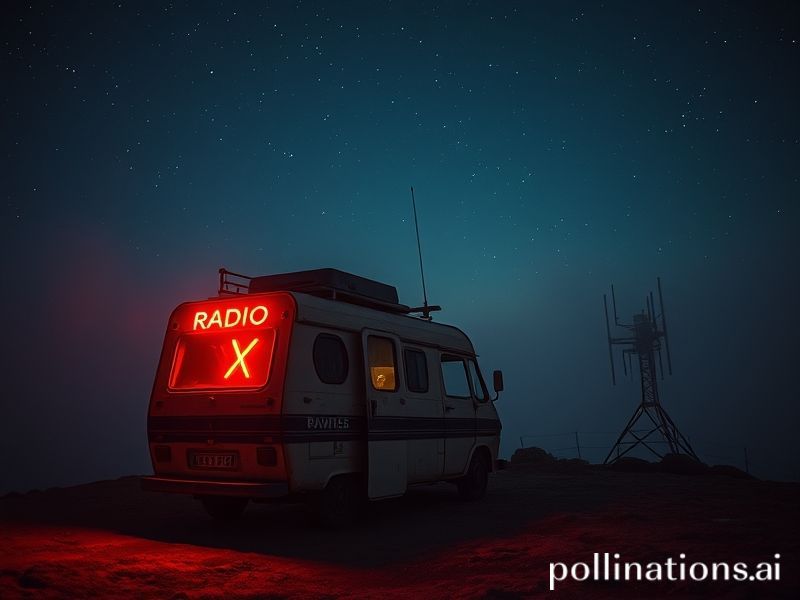Radio X: How a Montreal Pirate Out-Snarked the Global Media Empire
Radio X: The Little Frequency That Outran the World
by Our Man in the Ionosphere, filing from everywhere at once
Somewhere above the 49th parallel, a transmitter the size of a garden shed is humming at 101.9 FM. Locals call it Radio X; geographers might call it 45.5017° N, 73.5673° W; the CIA probably calls it Tuesday. What started as a Montreal student pirate in 1986 has quietly become the planet’s most influential audio contraband, proving that if you speak softly and carry a dirty joke, empires will trip over themselves to listen.
The station’s trick is equal parts nostalgia and nihilism: the playlist is 40% vintage Quebec garage rock, 60% whatever the intern found in a dead man’s glove box. On a good night you can catch The Stooges bleeding into a Senegalese field recording, followed by a live call-in where listeners debate whether poutine is a human right or a war crime. It’s chaotic, bilingual, aggressively local—and yet its web stream just passed 3.2 million monthly uniques in Jakarta alone. Turns out the universal language isn’t love, it’s sarcasm delivered with a Canadian accent.
Global broadcasters are taking notes. The BBC World Service—fresh off a pivot to TikTok explainers about how to boil water during a coup—has launched a pilot called “Radio Xtra,” featuring grime MCs reading the shipping forecast over lo-fi beats. France 24’s parent company is rumored to be courting the original Radio X founder, offering a Paris studio, diplomatic immunity, and lifetime supply of baguette. Even North Korea’s state mouthpiece, the dulcet Korea Central Broadcasting Station, experimented with a “comrade-approved indie hour” until someone queued Mac DeMarco and the entire staff disappeared.
Why does this scrappy feed matter? Because in 2024 the world’s airwaves are either algorithmic sludge or nationalist megaphones. Between Spotify’s AI mood playlists and whatever Elon renamed Twitter to this week, listeners have begun to crave the beautiful imperfection of humans making mistakes on live radio. Radio X’s midnight host once accidentally played the same Flipper track four times in a row and received 700 emails praising him for “inventing minimalist composition.” That sort of glorious incompetence is now a geopolitical asset.
Diplomats have noticed. During last year’s COP28 summit in Dubai, negotiators crowded into a hospitality tent tuned to Radio X’s stream, arguing over emission caps while the station aired a prank call to a Saudi oil helpline. The stunt didn’t lower global temperatures, but it did lower everyone’s blood pressure by at least three millimeters of mercury—measurable progress at U.N. gatherings. Meanwhile, the U.S. State Department’s soft-power nerds have drafted a memo titled “Leveraging Canadian Snark to Counter Chinese TikTok Diplomacy.” Somewhere in Ottawa, a bureaucrat is Googling “how to trademark sarcasm.”
Investors smell money too. Venture capital firms who spent the last decade burning cash on Web3 raccoon JPEGs are suddenly courting “authentic analog-adjacent audio experiences.” A16z just valued Radio X at $420 million—coincidentally the same number scrolled on the station’s bathroom wall in 1993 under the phrase “legalize it.” The founders, still wearing thrift-store leather, responded by auctioning their transmitter on eBay as an NFT, then shipping the actual hardware to a listener in Lagos who uses it to broadcast Nollywood gossip. Decentralization achieved; venture capitalists confused; everyone wins except the lawyers.
And yet the station’s greatest export may be existential dread wrapped in a three-chord joke. In Kyiv, programmers code to Radio X while air-raid sirens harmonize in the background. In Santiago, protesters blast its feed through supermarket intercoms to drown out elevator jazz. Somewhere on the International Space Station, astronauts reportedly huddle around a laptop tuned to the stream, homesick for a planet that still argues about music instead of extinction timelines. The irony is delicious: humanity’s most advanced outpost now relies on a station whose emergency broadcast protocol is “if the building’s on fire, play the Dead Kennedys.”
Ultimately, Radio X demonstrates that culture doesn’t scale—it leaks. No amount of satellites or syndication deals can replicate the moment a Haitian taxi driver in Miami hears his daughter’s college radio segment from Montreal and realizes the border is just a bad punchline. The signal travels farther than policy ever will, piggybacking on the shared joke that none of us really know what we’re doing, but the beat goes on anyway.
Tune in, drop out, and remember: if civilization collapses, someone will still be in that garden shed, cueing up the next song and asking listeners to name this apocalypse. God save the Queen, long live the static.







